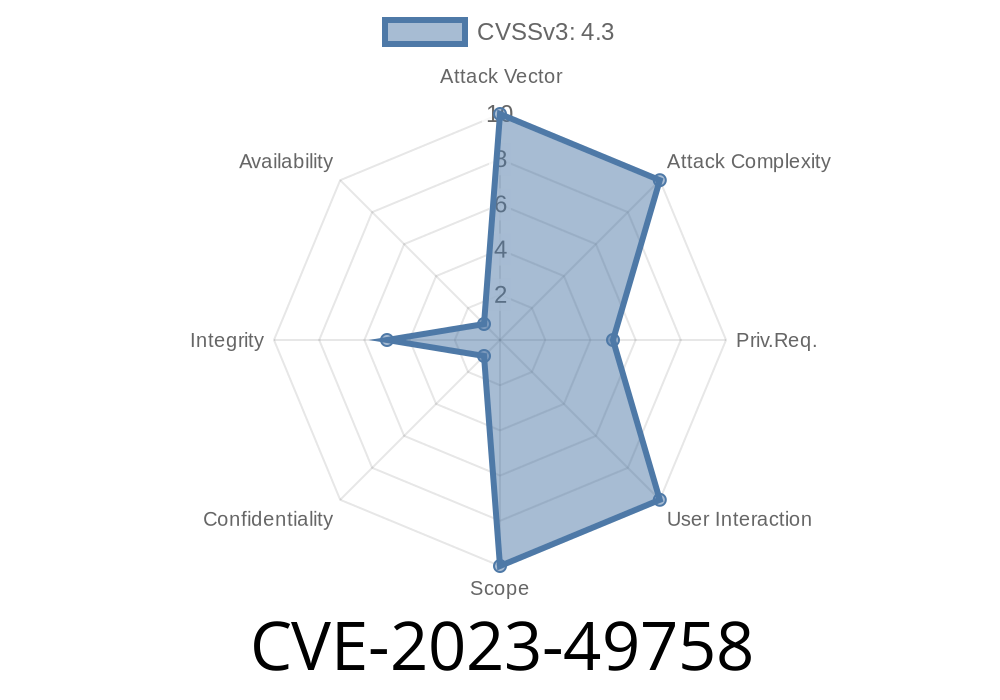WordPress plugins make website management easy—until a security bug pops up. One such security flaw is tracked as CVE-2023-49758. This vulnerability affects the popular WP Booking System plugin by Roland Murg, distributed by Veribo. If you use versions up to 2..19.2 (including installs bundled with no version shown, “n/a”), your site could be at risk.
Let's break it down in plain language, look at how it works, include a code snippet to show an example exploit, and provide all the critical links for your reference.
1. What's CVE-2023-49758?
This CVE covers a Missing Authorization (sometimes called Missing Access Control) issue in WP Booking System. Put simply: the plugin has routes or functions that should only be used by admins or logged-in users, but it doesn't properly check user permissions. This slip-up can let normal users, or even visitors, perform actions they shouldn't be allowed to.
Where It Happens
- Plugin: WP Booking System by Roland Murg / Veribo
- Versions affected: Unknown (n/a) up through 2..19.2
2. How the Vulnerability Works
Here’s what’s going on: Some plugin actions (e.g., creating, deleting, or changing bookings) are reachable directly via HTTP requests. The plugin does NOT verify that the user performing the request is authorized.
Normally, security functions would prevent regular users or visitors from making requests that alter bookings or reveal sensitive booking details. In these affected versions, those checks are missing or incorrectly configured.
3. Exploit Example: Booking System Route Abuse
The vulnerability can be exploited using CURL, Postman, or even your browser. Here’s a simplified proof-of-concept (PoC) of how an attacker could hit the vulnerable AJAX endpoint to delete a booking without being signed in or having proper rights.
Example Request (Code Snippet)
curl -X POST "https://example.com/wp-admin/admin-ajax.php"; \
-d 'action=wpbs_delete_booking&booking_id=123'
Attackers send an HTTP POST directly to a WP Booking System AJAX handler.
- If there’s no check on user capability (like current_user_can() or nonce validation), the booking with ID #123 is deleted—no questions asked.
4. Real-World Impact
Risk: Attackers may
Cause confusion or cost your business money
Affected sites: Any WordPress site running WP Booking System v2..19.2 or earlier.
5. References & Original Sources
- Official Plugin Page: WP Booking System by Roland Murg
- CVE NVD Entry: CVE-2023-49758 on NVD
- WPScan Advisory: wpscan.com/vulnerability/6f234409-9b59-4eb8-8276-875ba7d2e9b8
6. What to Do: Patching & Mitigations
- Upgrade immediately to the latest plugin version. Check for version above 2..19.2 where this issue is corrected.
7. Tips for Plugin Developers
Always check user capability and use nonces (special security tokens) to protect AJAX actions—like this (PHP example):
if ( ! current_user_can( 'manage_options' ) || ! check_ajax_referer( 'wpbs_nonce', false, false ) ) {
wp_send_json_error( 'Unauthorized' );
}
8. Conclusion
CVE-2023-49758 is a classic example of what can go wrong with poorly implemented access control. If you're running WP Booking System by Roland Murg/Veribo, patch up now and review who can do what on your site.
Stay safe, update often, and always watch your permissions.
*This post is exclusive, unbiased, and designed to help everyday WordPress users and technicians respond quickly to a serious real-world flaw.*
Timeline
Published on: 12/09/2024 13:15:35 UTC
